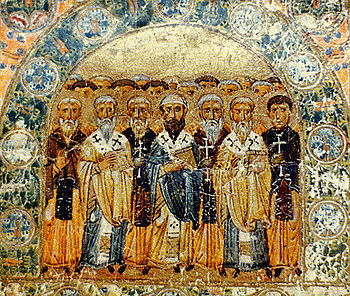
Back Kerkvaders Afrikaans آباء الكنيسة Arabic اباء الكنيسه ARZ Padres de la Ilesia AST Kilsə Ataları Azerbaijani Айцы Царквы Byelorussian Айцы Царквы BE-X-OLD Отци на Църквата Bulgarian চার্চ ফাদার Bengali/Bangla Tadoù an Iliz Breton
This article needs additional citations for verification. (November 2022) |

| Part of a series on |
| Christianity |
|---|
 |
The Church Fathers, Early Church Fathers, Christian Fathers, or Fathers of the Church were ancient and influential Christian theologians and writers who established the intellectual and doctrinal foundations of Christianity. The historical period in which they worked became known as the Patristic Era and spans approximately from the late 1st to mid-8th centuries,[a] flourishing in particular during the 4th and 5th centuries, when Christianity was in the process of establishing itself as the state church of the Roman Empire.
For many denominations of Christianity, the writings of the Ante-Nicene Fathers, Nicene Fathers and Post-Nicene Fathers are included in Sacred Tradition.[1] As such, in traditional dogmatic theology, authors considered Church Fathers are treated as authoritative for the establishment of doctrine.[2][3] The academic field of patristics, the study of the Church Fathers, has extended the scope of the term, and there is no definitive list.[4][5][better source needed] Some, such as Origen and Tertullian, made major contributions to the development of later Christian theology, but certain elements of their teaching were later condemned.
Cite error: There are <ref group=lower-alpha> tags or {{efn}} templates on this page, but the references will not show without a {{reflist|group=lower-alpha}} template or {{notelist}} template (see the help page).
- ^ Plekon, Michael (2003). Tradition Alive: On the Church and the Christian Life in Our Time : Readings from the Eastern Church. Rowman & Littlefield. p. 70. ISBN 978-0-7425-3163-5.
- ^ Brown, Stephen F. (2011). "Church Fathers". Encyclopedia of Medieval Philosophy. Encyclopedia of Medieval Philosophy. pp. 209–216. doi:10.1007/978-1-4020-9729-4_125. ISBN 978-1-4020-9728-7.
These teachers, both in the East and the West, manifested the strength of Christian truth and the power of Christian life in their writings that marked this period as the Golden Age of the Fathers. The end of the Patristic era is generally marked in the West with the death of St. Isidore of Seville (d. c. 636) and in the East with the death of St. John of Damascus (d. c. 750). The writings of the Fathers have been given great respect both in their role of establishing the Christian tradition of beliefs and patterns of living and also as works that provide a deeper grasp of the meaning of Christian truths or provoke questions that lead Christians to a deeper understanding of their beliefs.
- ^ Preus, J.A.O. (1984). "The Use of the Church Fathers in the Formula of Concord". Concordia Theological Quarterly. 48 (2–3): 97—112.
- ^ Kelly, John N. D. "Patristic literature". Encyclopedia Britannica. Retrieved 11 May 2018.
- ^ Rasmussen, Adam (10 June 2011). "Who are the Fathers of the Church? A chronological list". Catholic Theology. Retrieved 11 May 2018.